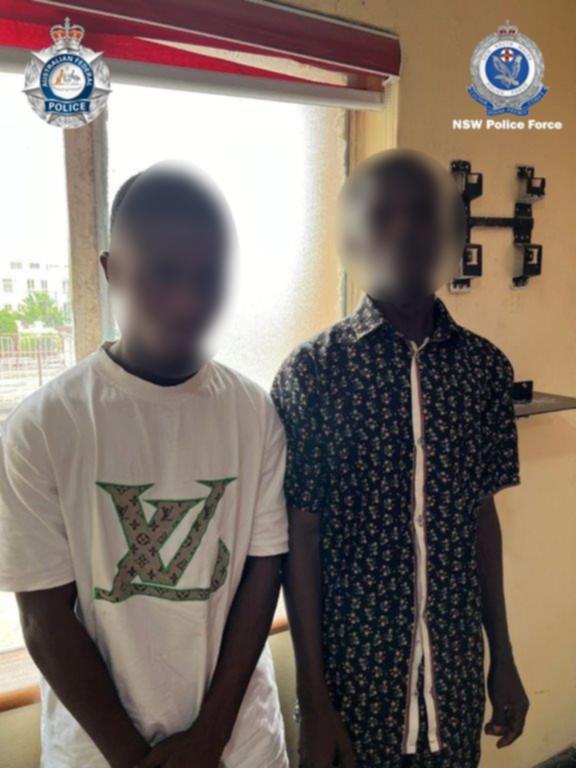Sextortion crisis: Police fears over welfare of thousands of Aussie kids caught up in social media blackmail
Police are fearing more youth suicides as criminals continue to use popular social media apps like Snapchat to target young Australians in sexual extortion scams each month.

Police suspect that more than 1000 Australian children are being threatened with financial sextortion each month and are expressing “serious safety and wellbeing concerns” for young people — following a spate of youth suicides — who are ensnared in the exploitative online scam.
Last year the Australian Centre to Counter Child Exploitation – led by the Australian Federal Police – received about 300 reports of sextortion targeting children each month.
This year the ACCCE has received about 110 reports a month but that number appears to be rising.
Sign up to The Nightly's newsletters.
Get the first look at the digital newspaper, curated daily stories and breaking headlines delivered to your inbox.
By continuing you agree to our Terms and Privacy Policy.Sextortion is a form of online blackmail where offenders trick or coerce someone into sending sexual images of themselves, and then threaten to share the images unless their demands — for money, more graphic content or sexual favours – are met.
The targets of these criminals are typically males between the ages of 14 to 24, but anyone can become a victim.
The AFP suspects the real number of cases involving Australian kids is about 10 times higher than those reported.
“Information available to the ACCCE indicates that the actual level of offending is much higher than reported to us,” an AFP spokesperson said.
“AFP-led ACCCE intelligence estimates that only one in 10 victims report.
“This is why we urge anyone to report any sextortion cases through the ‘Report Abuse Button’ on the ACCCE website.”

On Wednesday The Nightly revealed that in the last two years at least four youth suicides — involving three boys and one girl – in Victoria alone, had been linked to sextortion.
And on Monday New South Wales Police revealed that a teenager had taken his own life late last year after being blackmailed by two men in Nigeria, who had threatened to disseminate his intimate images unless he paid them $500 in gift cards.
“There are serious safety and wellbeing concerns for children who are caught up in financial sextortion and the suicide of any child is a tragic event,” an AFP spokesperson said.
“The AFP-led ACCCE is aware of other Australian cases where a young person has taken their life.”
It also recently came to light during court proceedings that a 17-year-old in Queensland, who fell victim to sextortion on Snapchat, was so distraught that he tried to commit suicide by ploughing his four-wheel drive into oncoming traffic.
After obtaining explicit photos from the boy, a scammer – posing as a girl called Amber Rose – threatened to distribute the images unless the teen paid them $900.
Even after the boy transferred $700 to the scammer, the criminal sent an intimate image of him to one of his friends.
The teen pleaded with the scammer, who it turns out was in Nigeria, to stop before threatening to take his own life.
“Hope you sleep better knowing you killed me,” the boy wrote in his final message to the criminal before grabbing his car keys and leaving the house.
He suffered only minor injuries in the horrific crash, which occurred on the Sunshine Coast in 2022, but killed beloved grandmother Karen Malcolm when he collided head-on with her car at more than 100/km per hour.
In January the boy, who is now 19, was jailed for manslaughter over the 63-year-old’s death.
A psychologist told the court that at the time of the offending, the teen – who cannot be named for legal reasons – was experiencing “intense distress” and an “acute stress reaction” in response to realising he had fallen victim to sextortion.
“As soon as they said they had my pictures my brain just exploded,” the teen told the psychologist.
In 2022 – weeks prior to that fatal crash – the ACCCE and the Australian government’s financial intelligence agency, AUSTRAC, established Operation Huntsman in response to the sustained increase in reports about sextortion.
The operation was designed to deny offenders access to the financial profits of their crimes to make the targeting of Australian children financially unviable.
Operation Huntsman engaged with Australian financial institutions to shut down accounts being used to facilitate the offshore transfer of funds.

As it became harder for offshore offenders to exploit the Australian banking system, they were forced to adopt other means of gaining access to the proceeds of their offending.
This is why the perpetrators of sextortion have begun demanding victims pay them in gift cards.
“The payment demands vary, including negotiating payments via cryptocurrency, bank transfer, online game or gift cards,” an AFP spokesperson said this week.
“ACCCE and AUSTRAC are aware of many varieties of legitimate gift cards being exploited by offshore sextortion offenders.
“The average amount we are seeing paid by victims is around $300, however we are aware of much higher amounts being paid.
“Unfortunately, it is sometimes the case that victims run out of money and report to police as a ‘last resort’.”
Many types of gift cards can be redeemed online and the value can effectively be transferred to a third party by email or instant messaging, eliminating the need for an offender to receive proceeds of their offending via a bank transfer.
Offenders in financially motivated sextortion are usually located overseas and primarily in West African countries such as Nigeria and Ivory Coast, or Southeast Asian countries such as the Philippines but perpetrators also live in Australia.
In December a western Sydney man was sentenced to four years’ jail at Penrith District Court for online child abuse offences, including the sextortion of a 12-year-old girl.
The man, 22, had solicited and extorted sexually explicit material from minors through Snapchat.
“This is a vile example of online sexual offending – a grown man preying on the innocence of a 12-year-old girl living on the other side of the country,” said AFP Constable Emily McFarlane.
“This is a growing trend and police efforts are focused on protecting Australia’s children from such an abhorrent crime.
“Sextortion can escalate in a matter of minutes, but it is important for children to remember it is not your fault and when you speak up, we will believe and support you.”
And in 2021 a West Australian man was charged with 247 counts of alleged international online ‘sextortion’ of 245 alleged victims through social media.
The 25-year-old allegedly pretended to be a teenage social media celebrity to ‘sextort’ girls online. The matter is still before the courts.
Amid this week’s youth suicide revelations, authorities are again urging parents, carers and educators to have important conversations with children to help keep them stay safe online.
eSafety Commissioner Julie Inman Grant told The Nightly that parents can play a critical role in tackling this serious global issue.
“Our message to parents is to have regular conversations with your children about what they’re up to online and online safety,” she said.
“Keep those conversations going in their teenage years as they use the internet to navigate complicated questions of identity, sexuality and their place in the world.
“As parents, we need our children to come to us whenever they encounter anything negative online, rather than bearing the burden in silence.
“Keep reassuring them: ‘When things go wrong online, don’t face it alone. I’m always here for you and will support you, no matter what.’”

Ms Inman Grant also urged parents to stay calm if their child is caught up in sextortion.
“If your child admits they’ve shared explicit content, try to swallow any fear or judgement you might be feeling and focus on next steps.
“These criminals are highly skilled in making their victims feel cornered, desperate and tremendously distressed.
“They will use a potent blend of guilt and shame to prevent victim disclosure and discourage help-seeking.
“In that moment, your child needs your love, support and reassurance to help them overcome their fear and shame, even as young adults.”
HOW TO MANAGE SEXUAL EXTORTION
- Be mindful of any approaches on social media for a “sexy chat” by people you don’t know.
- If you think you may have fallen prey to a sexual extortion chat, stop the chat immediately.
- Next, tell someone you trust. Dealing with sexual extortion can be deeply distressing but it’s worse on your own. Talking to someone can help you to clear your head.
- Take screenshots as evidence of the text and profile, and record the user URL.
- Report the blackmailer’s account to the platforms where the initial approach occurred.
- If you’re under 18, report it to the ACCCE (https://www.accce.gov.au/report). This constitutes child sexual exploitation and its specialist investigators will make sure you get the help you need
- If you’re over 18 and your intimate images have been shared, report it to eSafety.gov.au/report
- Seek mental health support if required.
- If you’re in crisis, call Lifeline on 13 11 14 or Kids Helpline on 1800 55 1800
Here’s what you should not do (as it can make things worse):
- DO NOT pay. If you’ve already paid, don’t pay any more.
- DO NOT respond to any demands or messages. Block and ignore.
- DO NOT send more images or videos.

